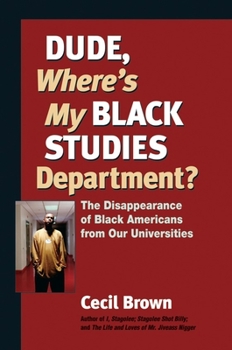Dude, Where's My Black Studies Department?: The Disappearance of Black Americans from Our Universities
***WINNER, 2008 PEN Oakland - Josephine Miles National Literary Award Blacks have been vanishing from college campuses in the United States and reappearing in prisons, videos, and movies. Cecil Brown tackles this unwitting disappearing act head on, paying special attention to the situation at UC Berkeley and the University of California system generally. Brown contends that educators have ignored the importance of the oral tradition in African American upbringing, an oversight mirrored by the media. When these students take exams, their abilities are not tested. Further, university officials, administrators, professors, and students are ignoring the phenomenon of the disappearing black student - in both their admissions and hiring policies. With black studies departments shifting the focus from African American and black community interests to black immigrant issues, says Brown, the situation is becoming dire. Dude, Where's My Black Studies Department? offers both a scorching critique and a plan for rethinking and reform of a crucial but largely unacknowledged problem in contemporary society.
Format:Paperback
Language:English
ISBN:1556435738
ISBN13:9781556435737
Release Date:May 2007
Publisher:North Atlantic Books
Length:160 Pages
Weight:0.55 lbs.
Dimensions:0.5" x 6.1" x 9.0"
Customer Reviews
1 rating
At last, someone's saying it
Published by Thriftbooks.com User , 17 years ago
This is an important book because it critiques a glaring problem in higher education in general, and specifically in the massive University of California system. Ever since proposition 209 was passed in California, effectively outlawing affirmative action, the black student population in the UC system has dropped to absurdly small numbers. In schools like UC Berkeley, which were once centers of the Black and Civil Rights movements, Blacks are now almost invisible outside of a few courageous and well-executed protests. Along with the drop in the student population comes a hollowing-out of Black Studies departments. These departments were formed in the '60's with a mission of community outreach and action. The idea was to have at least one department in the academy that reflected and worked with the communities that the universities were geographically close to, instead of keeping the Ivory Tower locked and isolated. But since then, Black Studies departments have lost that mission; they have become much more focused on the global African Diaspora than on African Americans. Although the African Diaspora is certainly worth studying, it should not overshadow the importance of African Americans in our own society and culture. Brown discusses the cultural import of Hip-Hop and its impact on the academy. Cecil Brown discusses all this with the voice of experience: he has been in and out of the UC system for much of his life, and experienced shocking racism and exclusion from the system. This is a book that the right people need to read. Anybody who is in higher education (especially administrators) should spend time with this book, and think about these issues. In a time when racial diversity has become a catch-phrase, what are we doing to create a truly more equitable society?





